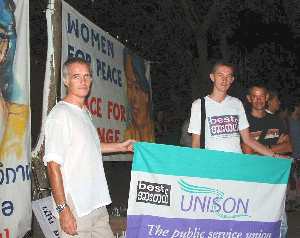|
 President
Nancy Coull made a special statement to Conference on 19 June about
the crisis in Burma, pledging UNISON's support to the sanctions
campaign. President
Nancy Coull made a special statement to Conference on 19 June about
the crisis in Burma, pledging UNISON's support to the sanctions
campaign.
Here, Murray Forgie (right - at a vigil in Chiangmai
on 19 June) of the Burma Educational Scholarship Trust, Scotland,
outlines the current situation.
Aung San Suu Kyi 58 on the 19th June 2003
Since May 2002 when Aung San Suu Kyi was released from 12 years
of house arrest, the international community has been hoping for
a genuine dialogue of reconciliation between her National League
for Democracy (NLD) and the ruling military junta. She was allowed
freedom of movement and the NLD party was able to reopen their offices,
but the release of other political prisoners was a trickle with
about 1300 still behind bars.
After months of dragging their feet, it became evident that
the military junta had no intention of starting any talks either
with the NLD Party or the ethnic minorities. As far as the military
junta was concerned the release of Aung San Suu Kyi was an end in
itself. The UN, diplomats and NGO's documented atrocities and human
rights abuses in particularly the Karen and Shan States, which continued
unabated and military attacks were reinforced against the Karen
National Liberation Army and Shan State Army.
Coupled with pressure from the International community anxious for
reconciliation talks to begin, the junta began to feel insecure,
attempting to rally the population and to make them feel threatened by
their traditional enemy, Thailand. Thus, a divide and rule campaign
of Thai-Burma border incidents and the shutting down of border checkpoints
began hindering trade.
The State controlled media in Burma broadcast and wrote abusive
accusations against the Thais and meetings with the Thai Foreign
Minister Surakiart and his Burmese counterpart U Win Aung were postponed
and eventually cancelled. The Thai government, anxious to appease
the military junta in Rangoon because of economic interests cracked
down on Burmese exiles in Thailand, restricting travel for Burmese
passport holders and threatening fleeing refugees with forced repatriation.
In the meantime Burma counts on China and India to blunt the effect
of any new sanctions from the United States and Europe. Burma's
geographical position between the two giants and a coveted coastline
along the Bay of Bengal gives the junta all the confidence needed
to continue to trade and receive technical help, both domestic and
military, from her neighbours.
Relations between Thailand and Burma progressively improved and
even became friendly culminating in an official visit in February
by Thai Prime Minister Thaksin to Rangoon. On his return, Prime
Minister Thaksin announced that Thailand would play a supportive role
of mediation between the ethnic minorities Karen, Shan, Karenni,
Kachin and Rangoon. Trade started to flow between the two countries,
as the junta desperately needed a friendly neighbour and Burma's
economy was on the verge of collapse.
A few days before Aung San Suu Kyi's month long political tour
in the north of Burma was brought to a premature and premeditated
end by clashes between the NLD party supporters and members of the
junta sponsored Union Solidarity Development Association. (USDA)
Burma's First Secretary General Khin Nyunt was in Thailand on a
foundation laying ceremony linking the two countries with a second
Mekong bridge. He assured the Foreign Minister Surskiart that the
reconciliation talks between the junta and Aung San Suu Kyi were
likely to resume soon. Mr Surakiart said that the move was encouraging and
Thailand had explained to other countries what was going on inside
Burma as the International community might not understand. The Burmese
and Thai leaders, he said, were friends.
It is not surprising if the rest of the world finds the situation
in Burma difficult to understand. After a carefully planned and
murderous attack by the junta, Aung San Suu Kyi is once again under
arrest though fortunately, as reported by UN Special Envoy Razali,
unhurt though nobody else has been allowed to see her. All the NLD
party offices are slammed shut; NLD party leaders are under house
arrest; the Universities are closed.
The regime has abandoned its attempted charm offensive and is openly
showing its true colours. This consistent and devious behaviour
of the Burmese junta is deliberate and calculated with the expertise
of an habitual artful dodger'.
Ironically, pressure to fulfill conditions laid down by UN resolutions
over a number of years, comes strongest from America and the UK
- with a much weaker and watered down compromise coming from the
EU. With an increasingly aware world citizenry questioning our leaders
about what is done - or not done - in our name, it is important
that all our leaders don't dodge these issues of multiple human
rights violations either.
Continued business dealings in any shape or form, which directly
profit the junta should cease immediately. Travel of junta members
and their assets overseas should be frozen and restrictions kept
in place until genuine national reconciliation talks begin.
ASEAN neighbours need to try to be good neighbours and pressurize
the junta for a change that blights the entire region on the international
stage - something they have failed to do thus far, for fear of engaging
in comment on the internal affairs of a co-member. Logic dictates,
that one day the junta will be gone, but the Burmese population
will still be there as their neighbours and allies.
Positive and constructive criticism from its neighbours and targeted
sanctions from them and the rest of the international community
against the Burmese junta are required to affect the release of
not just of Aung San Suu Kyi but all political prisoners; to stop
the torture; to stop trafficking in children and enforced labour;
and to stop the drug production and profiteering that has turned
Burma into a pariah state.
Murray Forgie
Burma Educational Scholarship Trust, Scotland
top
|



